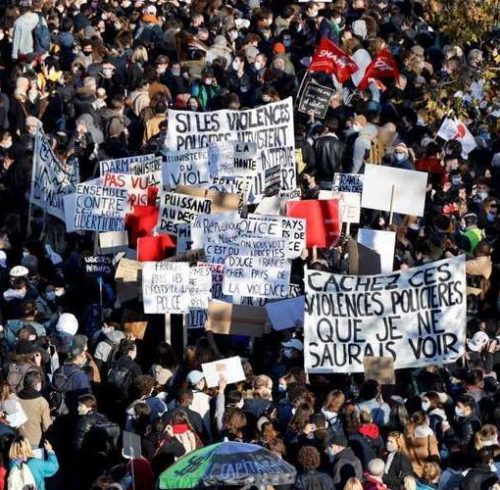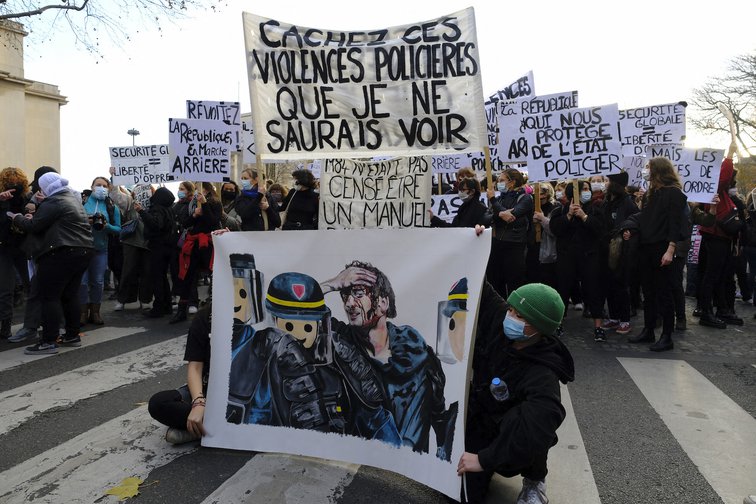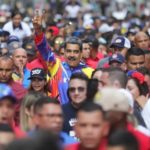AT THE END OF 2020, THE SITUATION IN FRANCE IN TERMS OF HEALTH, ECONOMICS, SOCIAL, ENVIRONMENTAL, POLITICAL AND DEMOCRATIC ISSUES RAISES MANY QUESTIONS ABOUT THE FUTURE OF THE COUNTRY. SOME NAIVELY THOUGHT A FEW MONTHS AGO THAT THE “NEXT WORLD” COULD ONLY BE BETTER AND BENEFICIAL FOR THE WHOLE OF SOCIETY, BUT THE EVOLUTION OF GOVERNMENT POLICY, WITH ITS RAPID REFORMS AND ITS VARIOUS BILLS OF FREEDOM-KILLING LAWS, RATHER MAKES US THINK THAT THIS WORLD COULD BE MUCH WORSE THAN THE ONE WE HAVE KNOWN UNTIL NOW, IF WE DO NOT DO ANYTHING TO CHANGE IT.
Catastrophic management of the health crisis:
The capitalist system has demonstrated at the global level its inability to face the pandemic, to anticipate the situation and to control its management. In France, this has resulted in the activation of the “Covid-19 Health Defence Council” that Emmanuel Macron designed on the “Defence & Security Council” model, with political leaders, senior officials and experts. All sworn to defence secrecy, these meet every week to take stock of the health situation. In his declaration of 6 March, E Macron had intimated that, the country being at war, he was arrogating full powers to himself through a State of Exception with arrays of ordinances and decrees. This way of operating removes all transparency in the decisions that are taken and their justifications.
This Health Defence Council provides data difficult to check and takes strategic decisions that seem inconsistent: confinement, de-confinement and re-confinement, opening of stores and supermarkets, the continuation of public transports but the closure of bars, restaurants and cultural centres described as non-essential. [..]
You would have thought that this health crisis was going to incentivise improvements for the public hospitals. But ever since the first wave of the pandemic however, no such thing has happened. If the famous measures of the “Ségur de la Santé”[1] made it possible, amongst other things, for the wages of health professionals to rise, this hardly made up for the wage freeze of the last ten years. And when the second wave of the pandemic arrived, all we saw was restructuring to raise productivity: closure of reserve beds, reduction of the workforce, increased workload for the care givers. These must now decide which patients are to receive priority of care. While 15,000 positions are still to be filled, this sector has lost some 7,500 posts due to the constantly worsening work conditions.
On top of this chaotic management of the epidemic, the public hospitals find themselves without the means to deal with other diseases like cancer. Two million operations were reportedly postponed, and screening tests were missed due to overload. A study of health professionals suggests that during the first confinement, the deprogramming of the [routine] surgical procedures might have caused between 1,000 and 6,000 extra fatalities, to be added those killed by covid-19, the latter amounting to 64,381 to date. And so, what about the other diseases, and the lack of medical follow-up in swathes of the population during this period? No-one can say for sure. What is certain is that the dilapidated state of the health service comes from the systematic destruction of the country’s public services over the many previous years.
The economic and social consequences:
Whilst the government has dedicated a large recovery fund of €100 billion for the companies to survive and avoid bankruptcy, the financial logic of the multinationals has remained the same as before the epidemic: increase the profits to secure the shareholders’ dividends. The State’s financial manna has only helped the private interests of the large industrial groups to respond to their capitalist logic. In the logic of the maximum profit, what comes first is a smaller workforce and a smaller wage bill. What we see now is a massive operation of restructuring and relocation in the direction of other countries like Poland or India where labour is more accessible and much cheaper.
The closure of production sites on French territory cuts down on Research and Development. The 400 jobs suppressed in this sector have yielded some €4 billion to the shareholders in dividends. The departure of the best thinkers from our country means a disaster at national level therefore, as shown in the example of the large French pharmaceutical group Sanofi unable to respond to the urgent need to manufacture an anti-covid-19 vaccine, which could only be ready for December 2021 at best!
Plans for massive layoffs are underway in all sectors, not to mention those resulting from the firms that have stopped activity. Forecasts point to around 900,000 people who could lose their jobs in 2021. This creates even more inequality and poverty, and the decline in purchasing power has never been greater. Today 10 million people suffer from hunger. The volunteers helping with food-aid discover new families and new types of populations every day, with an influx of young people under 25 for instance.
To survive, many families take out the consumer loans complacently offered by some banks. They soon find themselves over-indebted and in rent arrears. The loans that cannot be repaid are estimated to exceed €12 billion by 2021. The banks will bundle up those debts and resell them to collection companies that use harassment and intimidation to recover the funds. It is an infernal circle that may quickly push many families into the streets.
There are many more job seekers already, and others also in need of social benefits. At the end of October 2020, more than 2 million people were receiving such benefits. This causes great concern to the local authorities, as well as to the ‘départements’ when it comes to the RSA. The latter is a type of income support suddenly called upon to deal with an urgent increase in demand, while the authorities themselves continue to see big cuts and their budgets.
It is not the unemployment reform[2], now in preparation for 2021, that is going to help matters – far from it! As the jobs become rare, the long-term unemployed see their rights terminated. The resources for social benefits like the RSA, which is paid on condition of a return to work, are not going to keep up. People are already being deregistered from benefits on ground that they do not look hard enough for a job. This de-registering was stopped during the first confinement, but it is back in use again. The State increased funding to the country’s “insertion schemes” [3] on the basis that those schemes should create 60,000 new jobs in the coming year. But those schemes are in no position to respond to this explosion in the number of job seekers, quite apart from the fact that their task is to find a job for people within two years, not to resolve the problem of unemployment.
The worsening of the economic and social situation combines with the consequences of the health crisis which no one knows when it will end. For people forced to stay indoors in cramped and overcrowded housing, their confinement amounts to house arrest. As this comes on top of the break-down in basic social relations, it is going to have a disastrous effect on the lives and the health of people. It is in lower-income neighbourhoods that we see the most deaths from the pandemic. It is there that we see mounting fear, stress, depression and mental illness. Studies carried out in 2020 already pointed to more cases of aggression and physical violence than before, showing a society beginning to crumble everywhere for lack of perspectives.
The forced march of the Bills of Law and repressive measures:
In spite of this worrying situation, the government keeps the same policy. It presses onwards and forward with the forced march of its dangerous Bills of Law that condemn Liberty to death. What Emanuel Macron originally named “Separatism Bill” has become the “Law to Reinforce Respect for the Principles of the Republic”. This law is supposed to respond to the last “Islamist” attacks committed in France – with the notable case of the assassination of teacher Samuel Paty – and a cohort of very diverse measures ranging from compulsory schooling from the age of 3, to the fight against forced marriages and the ban on polygamy. This law destabilises the previous one of 1905 concerning the separation of church and state, and secularity. The Separatism Bill makes an amalgamation, once again, between terrorism and the Muslim religion, whipping up the fears and the discriminations. Now this Bill allows for the monitoring of all associations, religious or not. To qualify for public funding, the Sports Federations will have to sign a “Republican Contract”. Two new crimes have been created. The first, called ‘online hatred’, will rely on a law of 1881 (on the freedom of the press) to try transgressors through accelerated procedure. The second has to do with “endangering the life of others by disclosing information on their private life with the intention of harming them” – the focus falling here on demonstrating the intention to harm !
Can anyone win respect for the principles of the Republic, Liberty, Equality and Fraternity, seeing how these are flouted under regulations, as in insisting to keep the State of Health Emergency going until February? Where is the France of the Declaration of the Rights of Man and of the Citizen? The individual and collective freedoms are subjected to all kinds of prohibitions – public gatherings included [4]. Equality has given way to discrimination and social inequality, what with the growing gulf between rich and poor. As to Fraternity, you won’t find it outside the solidarity actions led by the population and the associations. You will only see it among those who defend the public services against the private interests; those who take disinterested collective initiatives; those who build social cohesion through volunteering, through mutual aid between neighbours, and who support the migrants.
The Global Security Law [5] allows the police to intervene in an uncontrolled and uncontrollable manner, since it will no longer be possible to film or broadcast its acts of violence. In angering people in their tens of thousands across France, this law has led to the creation of a coordination for the defence of the public freedoms, bringing together lawyers and journalists, along with artists, associations, leftist and progressist forces. When this law was passed on November 23, the violent and inhuman expulsion of migrants from the Place de la République in Paris sparked even more anger and mobilisations.
The current projects all go in the same direction. The ‘reforms’ put on ice due to the pandemic are shortly to bite back at the Pensions, Social Security and unemployment benefits. The blow will be hard for all the artists and contract workers in the entertainment field who find themselves with no shows and no out-0f-work rights.
In addition to this already very tense situation, three decrees were passed on 2 and 3 December 2020. The citizen’s registration procedures are enlarged to include their political opinions, their philosophical and religious convictions and their trade union membership – quite a panoply of added draconian measures. The White Paper on Defence and Homeland Security, the draft for a new law in 2022, projects to legalise the use of biometric measurements, facial recognition, artificial intelligence and drones in the monitoring of protests, to maintain order. Science fiction is old-hat. It is with the aid of technology that the war on the population is presently declared.
Demonstration in Paris 21.11.20 against 'the police state'














